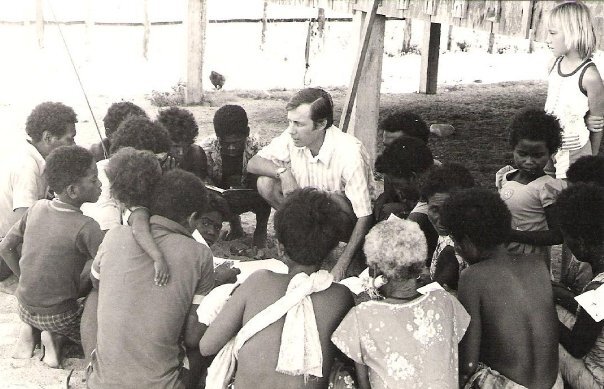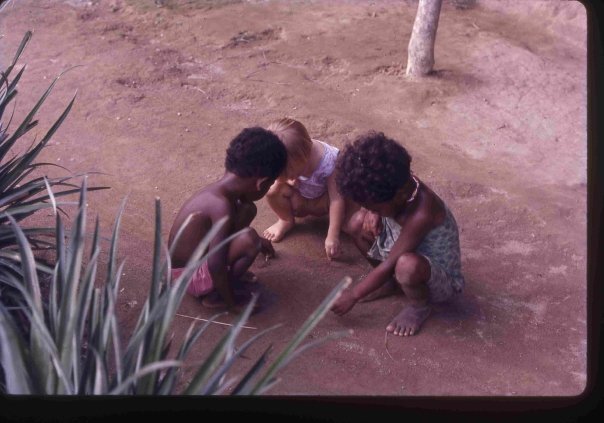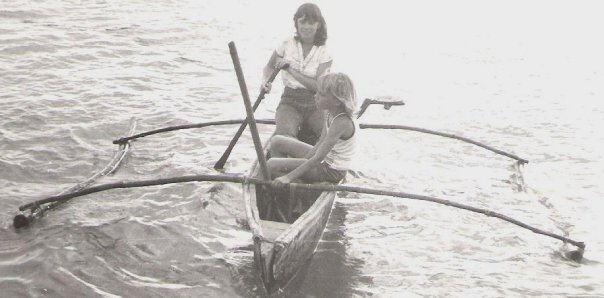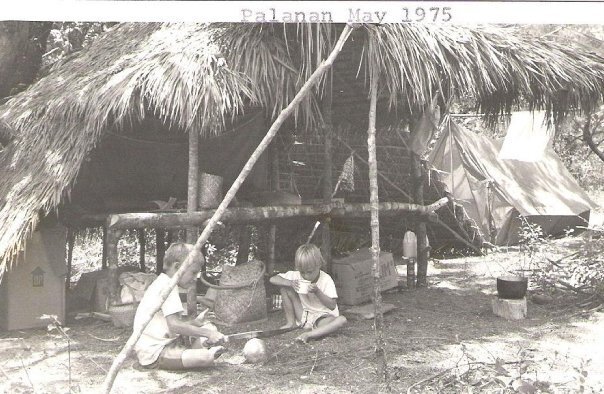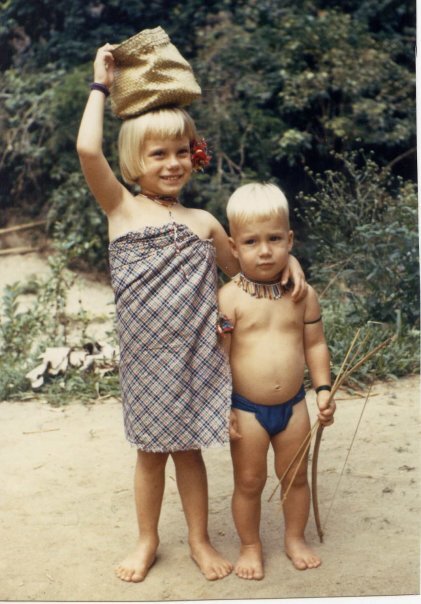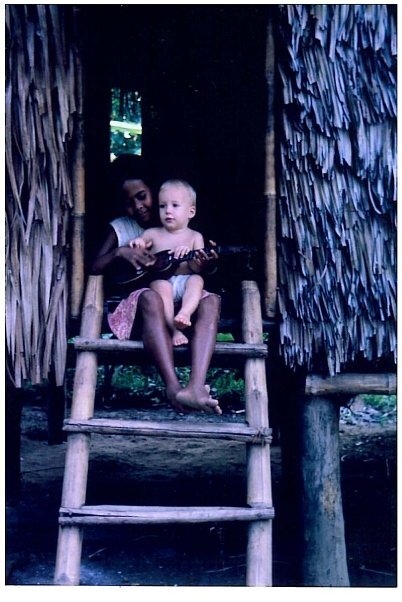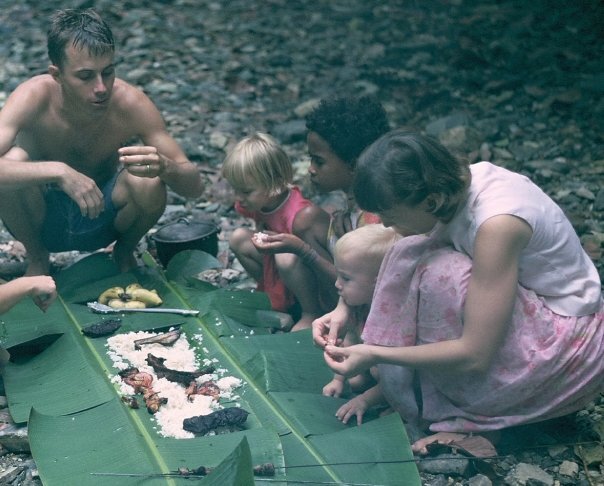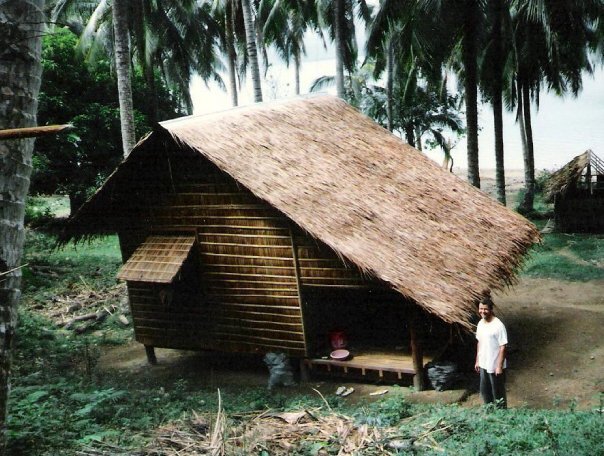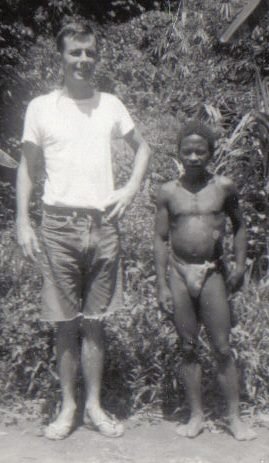Please consider your role in partnering with us to make a difference in the lives of these wonderful young men and women.
Where my story with the Agta people began...
Four months after their wedding in 1961, my mom and dad, Tom and Janet Headland, stepped off a freighter to live their lives among the Agta people in Casiguran, Philippines. Their goal was to learn the Agta language, translate the New Testament into their language, and do whatever else they could do to help the Agta people as they faced the encroachment of the modern world on their traditional way of life. At the time, the Agta people were primarily hunter-gatherers, who made their livelihood from collecting forest products which they traded or sold to the local non-tribal farmers and townspeople in valley downriver.
In 1970 my parents sponsored these 5 Agta friends of mine to go to school. They were Sawe, Heni, Edna, Bita and Noler. At that time, the nearest school took 2 hours to hike to, in the town of Casiguran, so they didn't last in the program for very long. But it was a good start. The boys are no longer alive, but the two girls, Edna and Bita, have children and grandchildren in our school program now.
In the years that followed, illegal logging industries destroyed the rainforest, and with that came the destruction of a way of life that the Agtas had been living for thousands of years. Faced with the loss of their culture and land, and without the means to cope with the sudden change, most Agtas became peasant farmers, working as day laborers for the outside population that moved into the area.
My sisters and I grew up with Agta people. Although we were Americans, our Agta friends never treated us as outsiders. We spent our time in the forest, on the beaches and in the rivers. And we shared my parents’ passion to do something, somehow, to help these precious people survive in a rapidly changing world. Too many times our efforts were not enough: I remember too many times, as a child, when we buried the bodies of my friends who had died from malnutrition or disease, and then walking home from the burial sites thinking about how things could be different.
In 1983, I graduated from high school and moved to the United States for further education. I remember that period as one of the most difficult times in my life; far away from my family and the culture that I knew, I agonized because of the love that I had for the Agta people. I prayed that God would give me a chance someday to do something that would help them.
In the years that followed I began to make trips back to visit the Philippines whenever I could afford to do so. Each trip was like a dream, sometimes arriving just in time to help someone get to the rural hospital in the town of Casiguran, and sometimes arriving hours too late. But whether I was in the Philippines or not, I prayed continually for the opportunity to help them in some way, and though the solution was not quick, God had a plan that was bigger than I imagined.
His word never fails...
For the first seventeen years of my parents work in the Philippines, their primary goal was to learn the Agta language and then to translate the New Testament into their language.
In 1977, one of the biggest goals my parents had set was completed: they finished the Agta translation of the New Testament.
As I grew up, the greatest motivating factor for why my family wanted to help the Agtas, was a strong conviction that these people were precious to the God who created them. Unlike the attitudes that prevailed, we really believed that these people were special, and that with God on their side they would not only survive, but that they would thrive. But we also believed that, just like any people, their future depended on a knowledge of Jesus' love for them and an acceptance of that love. And so we shared that message of love in everyday life, however we could, and my parents spent 17 years translating the New Testament so that the Agtas could read the story for themselves.
However, the Agtas didn't read. They didn't want to. They didn't need to. And so, the New Testament that my parents had worked so hard to produce remained unused for the next 20 years. My parents never called that "failure",iInstead, my dad would talk of "faithfulness" that was not dependent on results.
But something began to happen in 1997. The seeds that we had planted all those years were not planted in vain, and so thirty-five years after my parents started their work, the Agtas began to turn to Jesus. Person after person turned to him, and in turn told others of God's work in their life. The result is that most Agtas now claim to follow Christ, and the result of that is that the infant mortality rate has dropped from being the highest in the world (41% in the 1960s) to 16% in the 2000s. Furthermore, the chaos and violence that were once a part of daily life, due to alcoholism, is almost unseen today.
Over the years as I've returned to the various Agta villages I have asked what I can do to help. In February, 2015 on a short trip, the village pastors and elders explained to me that they wanted a way for their kids to be able to get higher education. They explained that education through 6th grade was free, but that because of the cost of tuition and other expenses, most of the Agta students could not continue. They wanted to know if I would be willing to help Agta students continue from 7th grade onward. I didn't know how I would be able to do it, but I really didn't feel I had a choice. As I discussed the program with them, I took a step of faith and committed to sponsoring the first 27 students, at $1/day per student. That would pay for their tuition, their boarding costs, their uniforms, their food, and provide them with some allowance.
We are now starting our fourth school year this fall of 2019. Each year the program has grown so that now we have almost 60 students. My plan is to take this indigenous group to the next step, by giving them the tools that they need to become self-supporting in the modern world. Each of the students has dreams; they talk of becoming teachers, doctors, pilots, pastors, and Bible Translators for other ethnic groups in other countries. I wouldn't have believed this could be true, and I would never have believed that I would be able to help make it happen. But God has a plan that is bigger than most of us can ever imagine, and the lesson for me is that his word never fails.
